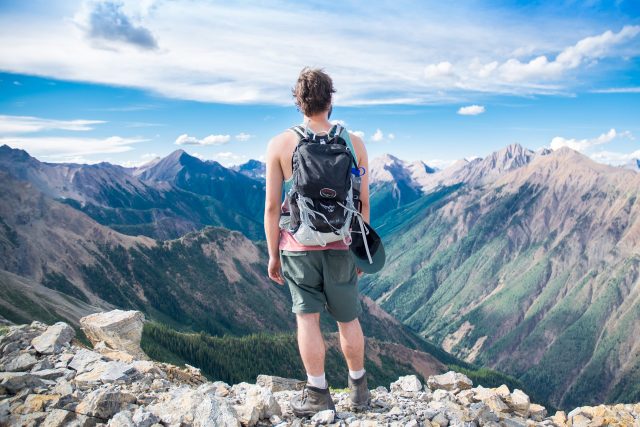Essential backpacking gear

If you are new to backpacking or you just need a reminder of what to take, this is the article for you. The following information covers most eventualities, and some of the items you can quite safely leave at home. Use common sense and this article to help you create a checklist that will work for you. If you’re going lightweight it’s often a good idea to try and choose items that have multiple uses.
Get creative though, and experiment with equipment to see what works and what doesn’t. If you do create a checklist you can always review it when you get home and start eliminating items and adding others for future trips.
The number one thing for you to do is to properly research where you are going. Find out the average temperature and climate of where you will be staying. You don’t want to take light hiking shoes when rugged hiking boots are needed, or forget to pack a thermal layer and find the temperature drops overnight.
The Essentials

These are the basic items you will need whether camping in summer or winter. An overnight trip will require these:
- Backpack
- Tent or Tarp & Bivvi Bag
- Sleeping bag
- Sleeping pad/mat
- Camp stove and fuel
- Cup/Bowl
- Spoon
- Knife
- Food
- Water bottle
- Water purifying system
- Flashlight
- Extra layers of clothes, hat & gloves
- Waterproof jacket & trousers
- First Aid Kit
- Sun protection
- Insect repellent
The Shelter

To have a good overnight or camping adventure, you need a form of shelter that will keep you safe, dry and comfortable. Here are some extra items you may wish to add to make it a more pleasurable camp.
- Camp pillow or a dry bag with some spare clothes
- Dry bag for sleeping bag
- Mosquito netting
- Ground cloth or tarp
The Clothing

Backpack and hiking clothing is the same. You need to consider the short-range weather forecasts and pack for the best and worst case scenarios.
- Hiking boots
- Sandals
- Thermal underwear
- Fleece jacket or vest
- Lightweight jacket
- Fleece pants and tops
- Hats and gloves
- Socks, including extras
- Moisture wicking top
- Waterproof Jacket & Trousers
Cooking

Before heading out make sure you know the fire rules and regulations, as this will affect how you cook your food. In most places, a propane stove should work well.
- Food – dehydrated or pouches/ready meals are convenient
- Pots and pans – If lightweight a large metal cup can be used as a saucepan and bowl
- Pot holders and tea towels (or you can use your bandanna)
- Utensils
- A good knife
- Lighter, matches or fire steel
- Water bottle
- Water filtration/purification system
- Plates, cups, and bowls – see above if going light
- Biodegradable soap
- Bear canister
- Hang bags for food storage
Safety

You should always take a small first aid kit with you on any hiking or backpacking trip. They don’t need to be huge and elaborate – you just need a few items to make sure to stay healthy and safe in the wilderness.
- First aid kit
- Cell phone or two-way radio
- Emergency blanket
- Duct tape
- Watch
- Flashlight and batteries
- Snake kit
- GPS locator beacon
- Ice axe
- Crampons
- Rope and cable ties
Navigating

Learn to use a map and know the route you’re going to take. Carry a compass and make sure you know how to use it. Make sure you tell people where you are going and how long you will be so that, in the worse case scenario, they know where you are.
- Map
- Compass
- Wilderness permit
- Field guide
- Information pertinent to the area
- GPS unit
Sun and Weather

Knowing how to protect yourself from the sun is an often-neglected subject. Unless you normally work an eight-hour shift in the sun on a daily basis, the increase in sunlight as you enjoy the outdoors will take its toll on you. Find out how long it takes to get sunburned in the area you are heading and don’t forget that wind can cause its own issues on your skin and lips.
- Sunscreen
- Sunglasses
- Lip balm
- Hat
- Insect repellent
- Bandanna for around neck
- Large water bottle/bladder
Personal Items

Keep in mind that personal items add weight to your backpack, but if you don’t mind carrying an extra item or two then go ahead.
- Camp towel
- Toilet paper
- Wet wipes
- Camping shovel
- Toothbrush and paste
- Hygiene items
- Prescription medicines
Extras

These are things you don’t necessarily need but can make things a little easier.
- Trekking poles
- Energy food (nuts and bars)
- Journal
- Binoculars
- Camera
- Tablet or book
Summary
The kit you carry is down to personal choice and what you take will depend greatly on the environment you are traveling in, the duration and your skill levels. Do remember what you carry in you need to carry out. This is especially important with wrappers and water bottles. Enjoy yourself out there.
If you have any comments then please drop us a message on our Outdoor Revival Facebook page
If you have a good story to tell or blog let us know about it on our FB page, we’re also happy for article or review submissions, we’d love to hear from you.
We live in a beautiful world, get out there and enjoy it. Outdoor Revival – Reconnecting us all with the Outdoors.
